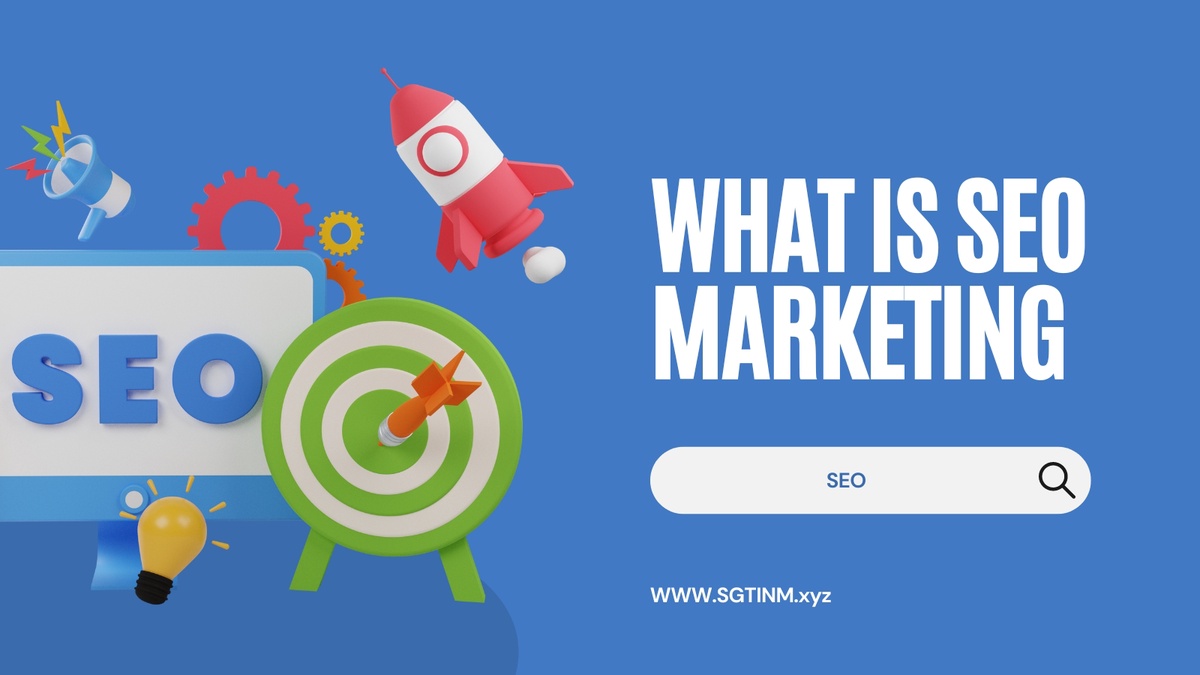SEO Marketing, also known as Search Engine Optimization Marketing, is the practice of optimizing a website or online content to improve its visibility and ranking in search engine results pages (SERPs). The goal of SEO Marketing is to increase the quantity and quality of traffic to a website from search engines, by ensuring that the website is relevant to the search queries entered by users.
SEO Marketing involves a range of techniques, including on-page optimization, off-page optimization, and local SEO. On-page optimization involves optimizing website content and structure, including meta tags, headings, and images, to make it more search engine-friendly. Off-page optimization involves building backlinks from other websites to increase the website's authority and credibility. Local SEO involves optimizing the website for local search results, such as including the business's name, address, and phone number in online directories.
The benefits of SEO Marketing include increased visibility and traffic to the website, higher conversion rates, and improved brand awareness and credibility. SEO Marketing can be a cost-effective way to attract high-quality, targeted traffic to a website, and can provide long-term benefits for businesses of all sizes.
Definition and explanation of SEO Marketing
SEO Marketing, also known as Search Engine Optimization Marketing, is a digital marketing strategy that involves optimizing a website or online content to improve its visibility and ranking in search engine results pages (SERPs). The main goal of SEO Marketing is to increase the quantity and quality of traffic to a website from search engines, by making the website more relevant to the search queries entered by users.
In essence, SEO Marketing involves understanding how search engines work, and optimizing website content and structure to meet the criteria that search engines use to rank websites. This involves identifying and incorporating relevant keywords and phrases into website content, optimizing meta tags and headings, building high-quality backlinks from other websites, and ensuring that the website is mobile-friendly and fast-loading.

How SEO Marketing works
SEO Marketing works by optimizing a website or online content to make it more relevant and visible to search engines. When a user enters a search query into a search engine, the search engine uses complex algorithms to identify the most relevant websites and pages to display in the search results.
SEO Marketing involves a range of techniques that aim to improve a website's relevance and visibility to search engines. These techniques include:
-
Keyword Research: Identifying the words and phrases that users are most likely to use when searching for products or services that the website offers.
-
On-Page Optimization: Optimizing website content and structure, including headings, meta tags, images, and URLs, to make it more search engine-friendly.
-
Off-Page Optimization: Building high-quality backlinks from other websites to improve the website's authority and credibility.
-
Local SEO: Optimizing the website for local search results, including adding the business's name, address, and phone number to online directories.
-
Mobile Optimization: Ensuring that the website is mobile-friendly and fast-loading, as search engines prioritize websites that are optimized for mobile devices.
The effectiveness of SEO Marketing depends on the quality and relevance of the website's content, as well as the quality of the optimization techniques used. SEO Marketing is an ongoing process that requires constant attention and adjustment to keep up with changes in search engine algorithms and user behavior.
When done effectively, SEO Marketing can improve a website's ranking in search engine results pages, increase website traffic, and drive more sales or conversions.
Importance of SEO Marketing for businesses
SEO Marketing is crucial for businesses for several reasons. Here are some of the most important ones:
-
Increased Visibility and Traffic: By optimizing a website for search engines, SEO Marketing can increase its visibility and ranking in search results pages. This, in turn, can drive more traffic to the website from users who are actively searching for products or services related to the business.
-
Improved User Experience: Effective SEO Marketing involves optimizing website content and structure to make it more user-friendly and easy to navigate. This can improve the user experience and encourage users to spend more time on the website, ultimately increasing the likelihood of conversions.
-
Cost-Effective: Compared to other digital marketing strategies, such as paid advertising, SEO Marketing can be a more cost-effective way to attract high-quality, targeted traffic to a website. While SEO Marketing requires an initial investment of time and resources, the long-term benefits can outweigh the costs.
-
Increased Brand Awareness and Credibility: When a website appears at the top of search engine results pages, it can increase brand awareness and credibility, as users tend to view these websites as more authoritative and trustworthy.
-
Long-Term Benefits: SEO Marketing is a long-term strategy that can provide sustained benefits for businesses that invest in it over time. Unlike other marketing strategies that may provide short-term boosts, SEO Marketing can provide long-lasting results that continue to drive traffic and sales for years to come.
In today's digital age, where most consumers begin their purchasing journey with an online search, SEO Marketing is essential for businesses that want to remain competitive and reach their target audience effectively.
How Search Engines Work
Search engines work by using complex algorithms to scan and index the vast amount of content available on the internet. Here's a simplified explanation of how search engines work:
-
Crawling: Search engines use specialized software programs called "spiders" or "bots" to crawl the web and discover new pages and content. These spiders follow links from one page to another, building a map of the web as they go.
-
Indexing: Once a page is discovered, search engines analyze its content and add it to their index, a massive database of all the content on the web. Search engines use this index to quickly retrieve relevant results when a user enters a search query.
-
Ranking: When a user enters a search query, the search engine uses its algorithm to analyze the index and identify the most relevant pages to display in the search results. Search engine algorithms take into account a wide range of factors, including the relevance and quality of the content, the user's location and search history, and the authority and credibility of the website.
-
Displaying Results: Once the most relevant pages have been identified, the search engine displays them in order of relevance, usually with the most relevant results appearing at the top of the page.
SEO Marketing Techniques
There are various techniques used in SEO Marketing to optimize a website for search engines. Here are some of the most common SEO Marketing techniques:
-
Keyword Research: This involves identifying the words and phrases that users are most likely to use when searching for products or services that the website offers. Keywords should be strategically placed throughout the website's content, including headings, meta tags, images, and URLs.
-
On-Page Optimization: This involves optimizing website content and structure to make it more search engine-friendly. This includes optimizing titles, headings, meta descriptions, images, URLs, and internal linking.
-
Off-Page Optimization: This involves building high-quality backlinks from other websites to improve the website's authority and credibility. Backlinks should come from reputable websites and should be relevant to the website's content.
-
Local SEO: This involves optimizing the website for local search results by adding the business's name, address, and phone number to online directories and creating location-specific content.
-
Mobile Optimization: This involves ensuring that the website is mobile-friendly and fast-loading, as search engines prioritize websites that are optimized for mobile devices.
-
Content Creation: This involves creating high-quality, informative, and engaging content that is optimized for search engines and resonates with the target audience.
-
Analytics and Tracking: This involves using web analytics tools to track website traffic, user behavior, and conversion rates. This data can be used to optimize the website's content and strategy further.
-
Technical SEO: This involves optimizing the website's technical aspects, such as its site speed, mobile responsiveness, and structured data, to improve its search engine ranking.
Effective SEO Marketing involves a combination of these techniques, tailored to the specific needs and goals of the business. It's essential to stay up-to-date with the latest trends and best practices in SEO Marketing to ensure the most effective strategy possible.
Measuring and Improving SEO Marketing Results
Measuring and improving SEO Marketing results is crucial to ensure the effectiveness of your SEO strategy. Here are some methods to measure and improve your SEO Marketing results:
-
Keyword Ranking: Tracking your website's ranking for targeted keywords is an essential method to measure the effectiveness of your SEO Marketing efforts. There are many tools available to track keyword rankings, such as Ahrefs, SEMrush, and Google Search Console.
-
Website Traffic: Another essential metric to measure is website traffic. Monitoring website traffic from organic search can provide valuable insights into the success of your SEO Marketing efforts. Tools such as Google Analytics can help you track website traffic and user behavior.
-
Conversion Rate: The ultimate goal of SEO Marketing is to drive conversions, whether it's making a purchase, filling out a form, or downloading a resource. Measuring conversion rates can provide insights into the effectiveness of your website's design, content, and user experience.
-
Backlinks: Tracking the number and quality of backlinks to your website is an essential method to measure the authority and credibility of your website. Tools such as Ahrefs and Majestic can help you track backlinks.
-
Content Performance: Monitoring the performance of your website's content can help you identify which content is driving the most traffic and engagement. You can use this information to optimize your content strategy further.
To improve your SEO Marketing results, consider the following tips:
-
Optimize On-Page Content: Ensure that your website's content is optimized for search engines by using targeted keywords, informative headings, and meta tags.
-
Build Quality Backlinks: Focus on building high-quality backlinks from reputable websites to improve your website's authority and credibility.
-
Mobile Optimization: Optimize your website for mobile devices to ensure a better user experience and improve your website's search engine ranking.
-
User Experience: Ensure that your website is easy to navigate, fast-loading, and provides a seamless user experience.
-
Stay Up-to-Date: Keep up-to-date with the latest SEO Marketing trends and best practices to ensure your strategy is effective and up-to-date.
By measuring and continuously improving your SEO Marketing results, you can ensure that your website ranks higher in search engine results and drives more traffic and conversions.


No comments yet